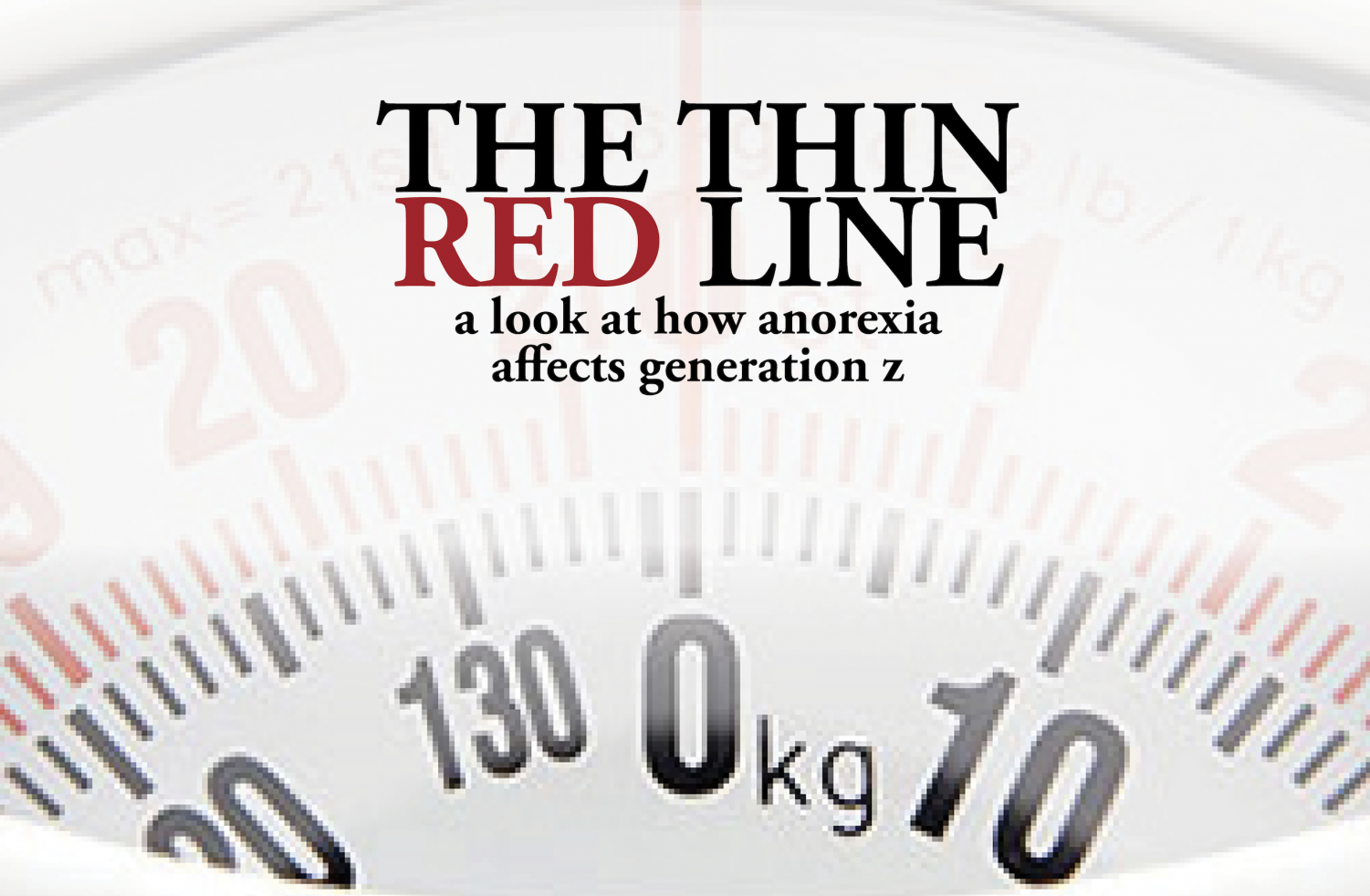Your donation will support the student journalists of Iowa City High School. For 2023, we are trying to update our video and photo studio, purchase new cameras and attend journalism conferences.
The Thin Red Line
September 26, 2018
A horrible head rush, hitting her head on the dresser on the way down, and blacking out for two minutes.
“I woke up shaking. It was probably my lowest moment. I went to the ER and I lied to them about not eating. I had been lying to everyone. The worst part was that I didn’t care about it, because I was that desperate to remain a certain weight,” Abigail* said.
The desperation to remain a certain weight, lying about food intake, and dizziness or fainting are all familiar to many of those with anorexia nervosa. Although anorexia nervosa can be different for each individual with it, and there is not a strictly set definition, it is mainly characterized by a misconception of how one’s body looks and going to extremes to restrict how much one eats.
Anorexia nervosa is a psychological condition and is different from anorexia, which means a loss of appetite or inability to eat. However, “nervosa” is often dropped in conversation about the disorder, so the difference is only distinguished through the context in which it is being used. Throughout this article, anorexia nervosa will be referred to as “anorexia” because that is the way it is most commonly referred to in present-day American society.
“It’s really frustrating to me. I think people think of it as a weight disorder, like if you’re this BMI you are anorexic, but weight is only a small component of it,” Irene Samuelson ‘19 said. “Every person’s body is so different; every person’s body belongs in a different place. You can deal with an eating disorder at any weight.”
Although there is a common misconception that one must be severely underweight to have anorexia, medical professionals and those affected know that that is not the case, due to the psychological nature of the illness.
“The biggest thing people don’t understand about eating disorders is the fact that if the person isn’t visibly anorexic or bulimic, then they aren’t suffering. They are. You can weigh 200 pounds and starve yourself in ways that cannot be seen,” Abigail said.
Many people with the disorder may go a long period of time without it being detected, even when in frequent contact with medical professionals, because of this view that one with anorexia must be thin.
“I wasn’t a ‘red flag’ to people because I was never really the image people have in their heads of someone dealing with an eating disorder until I had been dealing with it for a really long time,” Samuelson said. “So even my normal doctors missed it in me and it took until I went to my orthopedic doctor for anyone to catch it.”
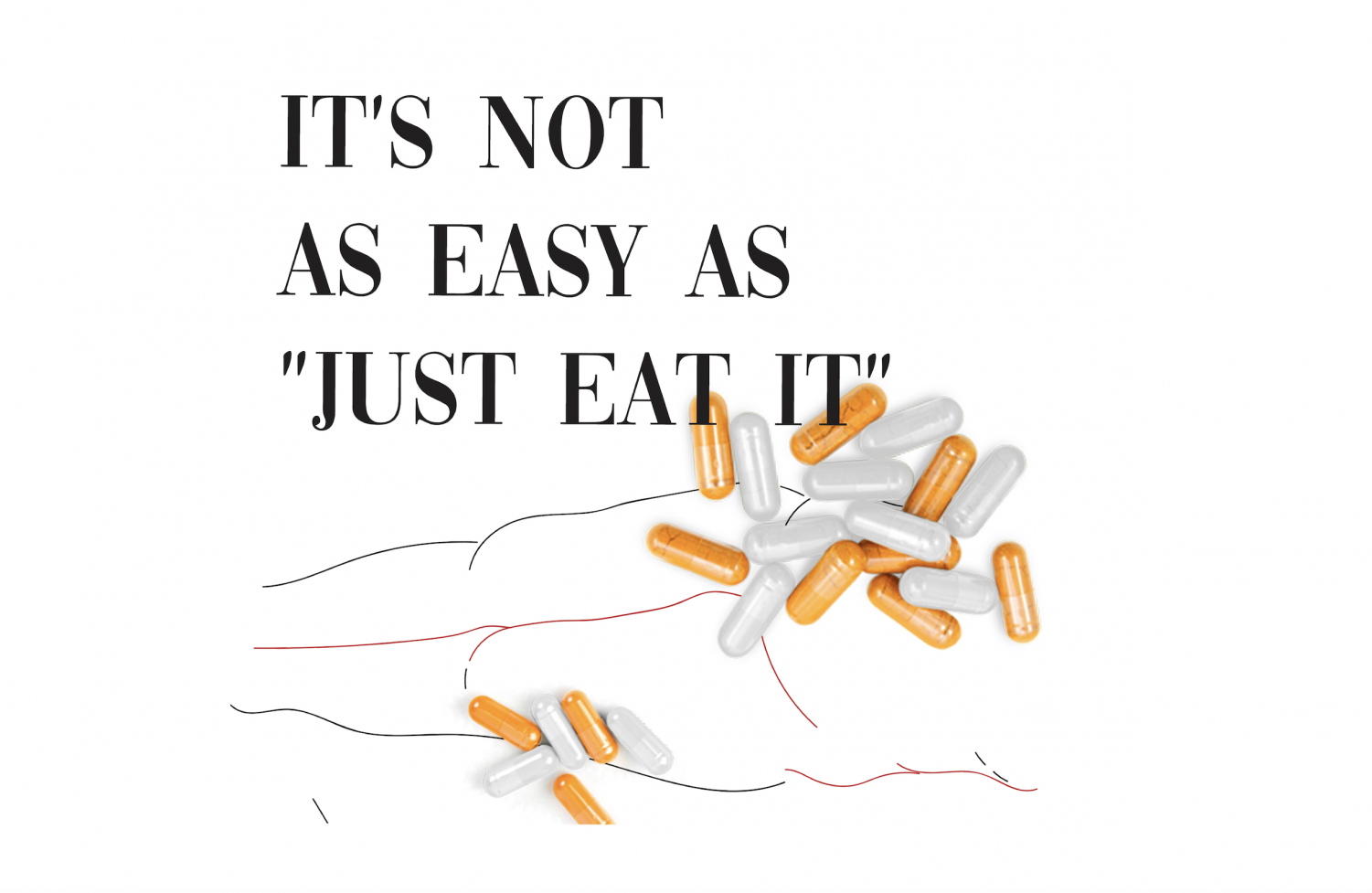
Losing a significant amount of weight is a part of anorexia, and it often comes before the changes in the thoughts one has about themselves takes place. The weight loss that may come first can be from a variety of different causes. Sports, and more specifically cross-country or running, can be part of the initial weight loss for many.
“During the summer before eighth grade, I started to think more about what I ate and how much I ate because I knew that it played a big role in how fast you were for cross-country,” Monica* said. “At the beginning of the summer, it started out as a healthy meal plan. I was trying to fit in all the food groups. But then as the summer progressed, I started counting calories for every meal and at times I wouldn’t even allow myself an extra apple or more grapes because I knew that it could be 80 extra calories. With running more and starting to eat less, I started to lose more and more weight and I didn’t notice. At the time, it was so gradual that I didn’t think I looked unhealthy.”
Cross-country was a contributing factor for Sandra* as well.
“I think it started with cross-country. cross-country in general is a sport where some people lose weight–I lost like 10 pounds. I don’t remember why, but I remember the feeling of feeling chubby, how ugly I was, and how nobody would ever care for me. So I started looking up things like ‘how to lose stomach fat’ or ‘tips and tricks to lose weight,’” Sandra said.
Medication that suppresses appetite can also contribute to weight loss, which in turn can lead to the repetitive thoughts about food and body image that those with anorexia experience.
“It started when I started taking medication for my ADHD in about third grade. I began poor eating habits and would go all day, many days of the week, without eating because the medication gave me a significantly decreased appetite. I just wasn’t hungry. The thing is, I didn’t start having body image issues until I started growing older and more mature,” Abigail said. “I didn’t realize that girls’ hips and thighs are supposed to get wider during puberty, so it was shocking to me how much weight I gained when I stopped taking the medication after sixth grade. So about halfway through seventh grade, my grades were dropping and I was getting bigger–in my mind of course–so I asked to start taking medication again. They switched me to adderall and that worked like a dream. I wouldn’t eat for days.”
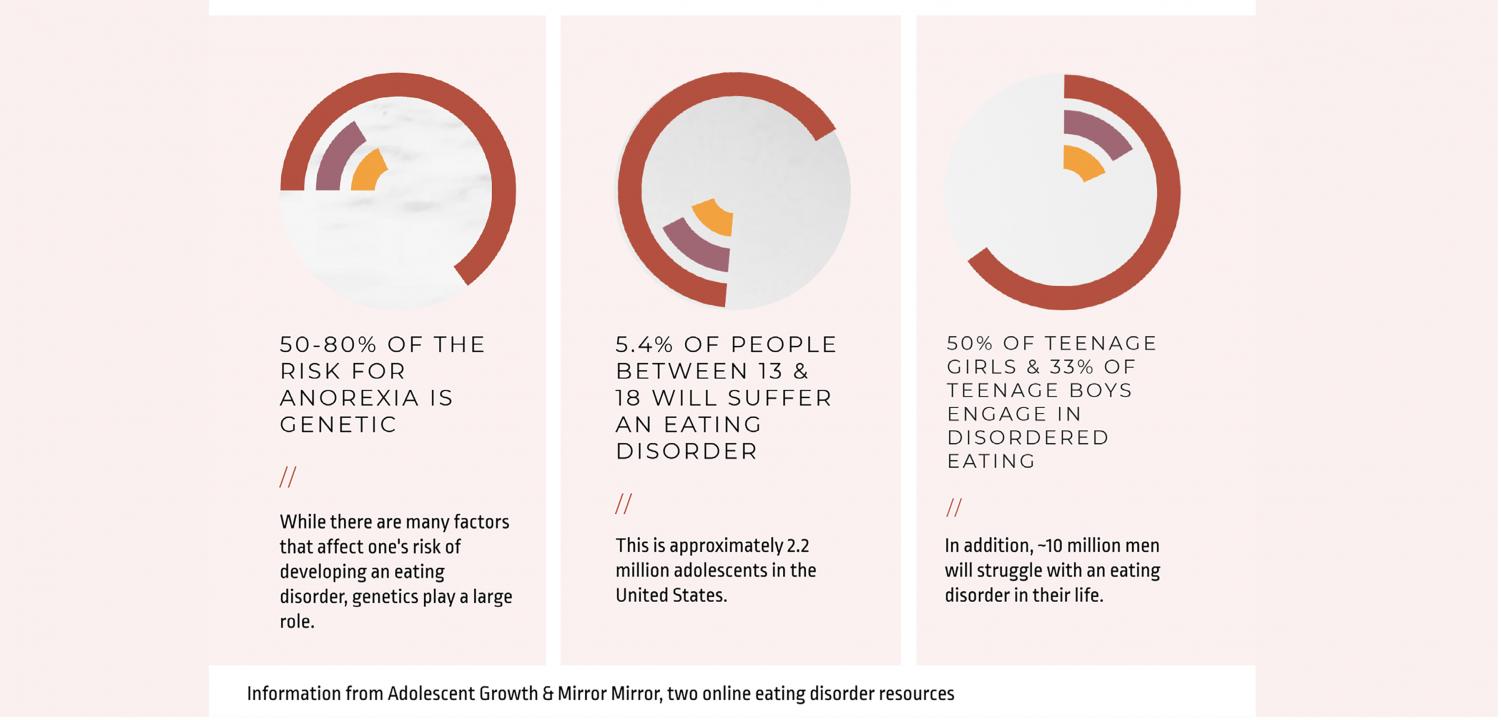
But beyond the scope of sports or medications, there are an infinite number of factors as to why someone may become anorexic. These can include, but are not limited to, compulsions from OCD that include food, decreased appetite due to depression or other mental illnesses, genetics, bullying, large disruptions in the family or social life that leaves those affected feeling like they need to regain control over their life, or pressure from family members, peers, or society as a whole.
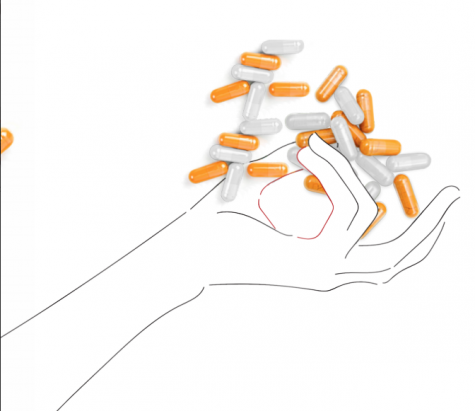 “As a kid, my brother and I were pretty chubby, and I think my mom blamed herself for it. She didn’t mean to, but she kinda fat-shamed us. Like when we were eating, she would tell us to eat less,” Charlotte* said. “I eventually grew out of it, but I was still really uncomfortable with the way my body looked. So I think I started at the end of sophomore year and just finally loved how thin I was getting.”
“As a kid, my brother and I were pretty chubby, and I think my mom blamed herself for it. She didn’t mean to, but she kinda fat-shamed us. Like when we were eating, she would tell us to eat less,” Charlotte* said. “I eventually grew out of it, but I was still really uncomfortable with the way my body looked. So I think I started at the end of sophomore year and just finally loved how thin I was getting.”
Factors are not always independent as well. A combination of many that are related is how many eating disorders, not just anorexia, begin.
“I had this really strong feeling in me that my worth was based on how I looked. And when I felt insecure, or I didn’t feel okay with things, I was like, ‘Well if I can work on how I look, then I can improve this,’” Samuelson said. “During my parents’ divorce, I really wanted to be in control, and I could do that by taking control of my body and my food. I just became obsessed with everything I was eating and getting it down to the littlest amount and was weighing myself constantly.”
The possible contributing factors that can lead to an eating disorder can be experienced by anyone, as can the disorder itself. But the demographic with the highest rates of developing one are females ages 12-20, according to the CDC.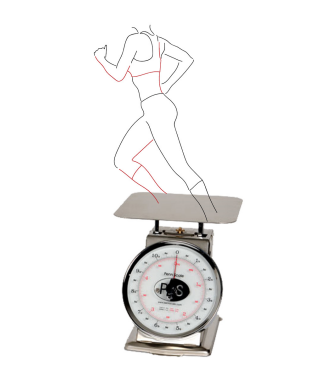
“It’s crazy how common it is and people don’t seem to notice it. I have not met a girl yet who I’ve talked to who has not dealt with this. I mean choosing to not eat to be skinnier. Some only do it for a short period of time, but so many do it for prolonged periods of time. Especially the girls that we just see as ‘normal-sized,’” Charlotte said.
The rate of females ages 12-20 with eating disorders is 25 percent, according to a 2008 study done by the CDC. According to the same study, 11 percent of males of the same age group were found to have an eating disorder. Many researchers think that this discrepancy leads to the tendency of society to overlook males with eating disorders: between females and males with comparable symptoms, females were 3.5 times more likely to have received treatment.
There are many signs and symptoms of anorexia, and although they differ case-to-case, there is usually a degree of similarities between all those affected.
“It was hard for me to believe that I was thin. I would step on the scale about five or more times daily and I even joined track in the spring to burn off what I binge ate,” Abigail said. “I used laxatives and other ways to get myself to flush my system. I became vegetarian. And eventually I started blacking out and it’s led me to the hospital a couple of times.”
“I remember I would tell myself, ‘If I go three days without eating, I’ll feel better,’” Charlotte said.
The mental side of anorexia often includes a preoccupation with food and calories, strict dietary rules, skipping meals, denial of hunger, a distorted view of one’s body, and an intense fear of gaining weight and desire to lose more. Many also suffer from depression due to a lack of nutrition necessary for brain function. Physically, the symptoms are those of weight loss or malnutrition generally. This can mean fatigue, irregular heart rhythms, intolerance of cold, dry or yellowish skin, dehydration, abnormal blood counts, loss of menstruation in females, hair that is thinning or falling out, and low blood pressure, according to the Mayo Clinic.
The physical and mental aspects of anorexia do not always follow the same timeline. During recovery, one typically gains back weight and restores physical health long before they mentally view food and their body in healthy ways again. The time between the two both normalizing can be anywhere between a few weeks to multiple years.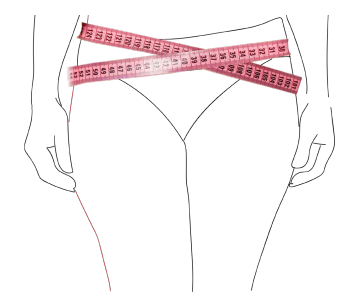
“The winter of eighth-grade year is when I started to gain some weight back. I wasn’t running as much during the winter, so naturally I started to gain more weight, but I was remember I was really frustrated and I always felt really gross because I thought I looked fat and so many of my clothes weren’t fitting anymore,” Monica said. “There was never a true turning point for me where I realized what I was doing wasn’t healthy, it just happened naturally over the second half of eighth grade when I started to gain back weight. I wasn’t happy about it, but through running in the summer before my freshman year, I just realized that the way that I was and how I looked was fine. I could run well while not being skinny and needing to record everything that I was eating.”
Even though Sandra’s illness mostly took place one to two years ago, she said it sometimes feels like it never quite goes away. “I still revert to that thinking. Less, of course, now, but everyone with it has those times.”
Recovering from anorexia is a difficult but necessary process. The National Institute of Mental Health reports that at 10-20 percent, anorexia has the highest mortality rate of any mental illness. There are many reasons for this, including its “chronic nature” that can lead to heart failure, but also because of high rates of suicide. The National Association of Anorexia Nervosa and Associated Disorders observed that one in every five deaths of people with anorexia is due to suicide.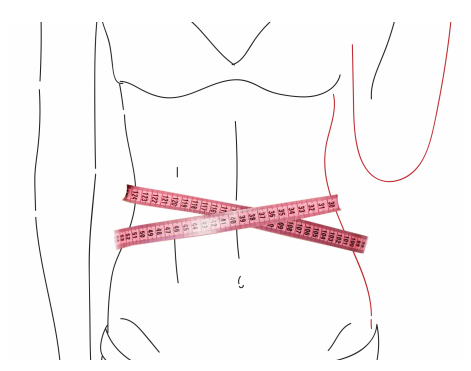
“The most helpful things for me were having a therapist and a dietitian,” Samuelson said.
Mirasol Recovery Centers states that “without treatment, up to 20% of people with serious eating disorders die. With treatment, the mortality rate falls to 2-3%.” However, the vast majority of those with eating disorders do not get professional treatment. Although the 2008 CDC study found that females were 3.5 times more likely than males to receive professional help, the highest rates of females getting professional care did not exceed 17 percent.
The recovery process for most people with anorexia is through friends, family, and themselves.
“Sometimes what you really need from people when you’re going through something like this is just to have people be there and not for them to be critical or judgemental,” Samuelson said.
“My friends have unknowingly been the biggest step in my recovery,” Abigail said. “I’d say that finding the people that allows you to be in your own skin and knowing that you’re loved is hard to come by, but it’s the only way I’m able to accept any and every version of myself.”
Despite the fact that friends can be of great use during recovery not only for anorexia, but for all eating disorders, many do not tell their friends or are hesitant to.
“At the time, my friends did confront me and they said that I looked skinnier than usual and that I had lost some weight. They asked if I was doing okay,” Monica said. “I just kind of avoided the subject and said that I was fine, that nothing was wrong, because I didn’t want to accept that I had an eating disorder because there’s such a stigma around it. People start to pity you and act like you’re a sick person.”
“No one helped me through it. I thought people might not believe me, I would be embarrassed, and people might think I’m attention-seeking,” Sandra said.
The internal battle about whether or not to be open about anorexia is sometimes a one-time event, and after deciding not to tell anyone, some stick to it. Others contemplate for a while and may change their minds at some point.
“At first I was kind of ashamed of it and just wanted to keep it a secret. But then I realized that the more I talked to people about it, and externalizing it, I just felt the support that there was and myself growing a little bit,” Samuelson said. “I was able to process it in a new way when I talked to people about it.”
Regardless of how many people someone with anorexia might tell, there are things that many wish the world of people who have never experienced an eating disorder knew.
“[People with anorexia] aren’t doing it because they want to do it. It’s not a choice that you make at every meal, it’s something that you feel like you have to do,” Charlotte said.
Not only is it not a choice, but according to Samuelson, it’s a lot more complicated than many might think it is.
“I think a lot of people don’t understand that it’s not as easy as ‘just eat it,’” Samuelson said. “Sometimes thinking about eating sugar would be like eating tacks. Like, why would I do that to myself? I think that’s hard for people to understand.”
But Monica feels that it’s important for people to realize that eating disorders can be fairly simple when it comes to at least one thing: the view those affected have of their bodies is not how they truly are.
“You know in school when you learn about eating disorders and they have a skinny person in front of a mirror but in their eyes they look bigger than they actually are? That’s actually a thing,” Monica said. “Looking back at pictures, I can’t imagine how I didn’t think that I was too skinny.”
Anorexia and all eating disorders can be different for everyone who experiences them, but they should all be dealt with carefully by those around them.
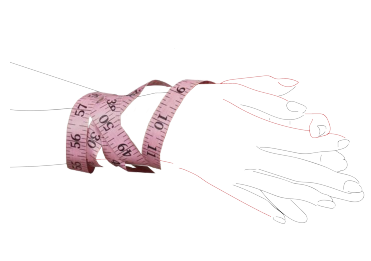 “To the people still struggling, you are beautiful,” Sandra said. “Be your own person and love yourself. I understand it’s hard. I still struggle with it myself. But if you think someone else is struggling with one, don’t just go up to them and ask; that can be really uncomfortable.”
“To the people still struggling, you are beautiful,” Sandra said. “Be your own person and love yourself. I understand it’s hard. I still struggle with it myself. But if you think someone else is struggling with one, don’t just go up to them and ask; that can be really uncomfortable.”
If someone you know is struggling with an eating disorder, or you think that they might be, do not keep it to yourself. Recovery is more likely the earlier the disorder is acknowledged and recovery methods are begun. If you can, talk to them or their loved ones about what you have noticed. Although recovery is possible to do alone, support systems made up of friends, families, and medical professionals can greatly increase the likelihood of regaining full physical and mental health by those affected, as well as allowing those who are trying to recover to know that they are cared for and loved, and that they do not need to fight it alone.
